2008 Romanian local elections
Local elections were held in Romania on 1 June 2008, with a runoff for mayors on 15 June 2008.[1]
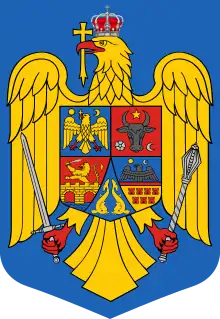 |
|---|
On 1 June elections were held for:
- all the villages, communes, cities, and municipal councils (Local Councils, Romanian: Consilii Locale), and the Sectors Local Councils of Bucharest (Romanian: Consilii Locale de Sector)
- the 41 County Councils (Romanian: Consilii Judeţene), and the Bucharest Municipal General Council (Romanian: Consiliul General Al Municipiului București).
- the 41 Presidents of the County Councils (Romanian: Preşedinţii Consiliilor Judeţene)
- all the mayors (Romanian: Primarii)
- of the villages, cities, and municipalities
- of the Sectors of Bucharest (Romanian: Primarii de Sector)
- The General Mayor of The Municipality of Bucharest (Romanian: Primarul General al Municipiului București)
On 17 April 2008, the Social Democratic Party and the Conservative Party announced they would form a political alliance for these elections, the Alliance PSD+PC.[2] For the first time the presidents of the County Councils were elected directly by the people, and not by later negotiations inside the County Council; other notable characteristics included a substantial number of Roma candidates standing, as well as some representatives of the Romanian Orthodox Church.[3] Turnout was low, with fewer than half of the eligible voters turning out to vote; in most big cities, except for Constanţa (incumbent PSD member Radu Ştefan Mazăre won) and Cluj-Napoca (incumbent Democratic Liberal Party member Emil Boc won), the election was not decided in the first round; in Bucharest, PDL member Vasile Blaga and independent Sorin Oprescu (former member of the PSD) will meet in the run-off.[4]
Overall, PD-L got 28.37%, PSD got 28.04%, PNL got 18.66%, and UDMR got 5.43% of the cast votes.[5][6]
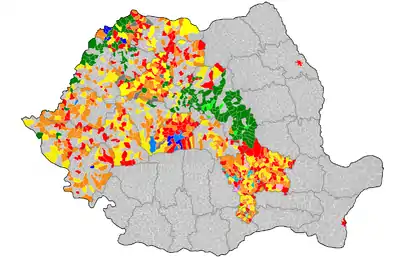
First round
Mayors

The most notables victories of the election ("Top 10") are listed below:
| Name | Political Party | City | Percentage |
|---|---|---|---|
| Klaus Iohannis | FDGR | Sibiu | 83.2% |
| Florin Cârciumaru | PSD | Târgu Jiu | 82.5% |
| Darius Vâlcov | PD-L | Slatina | 81.07% |
| Gheorghe Ştefan | PD-L | Piatra Neamț | 79.3% |
| Liviu Negoiță | PD-L | Sector 3 (Bucharest) | 79.0% |
| Constantin Hogea | PD-L | Tulcea | 73.4% |
| Tudor Pendiuc | PSD | Piteşti | 72.0% |
| Emil Boc | PD-L | Cluj-Napoca | 70.2% |
| George Scripcaru | PD-L | Braşov | 69.8% |
| Radu Mazăre | PSD | Constanţa | 67.9% |
| Gheorghe Falcă | PD-L | Arad | 67.6% |
Local Councils
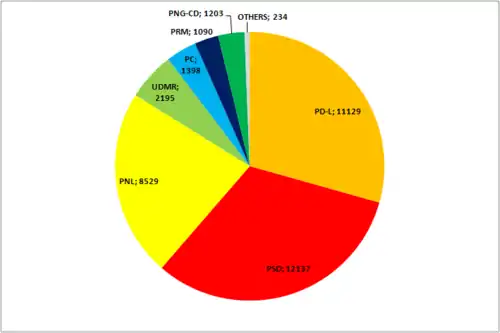
County Council Presidents
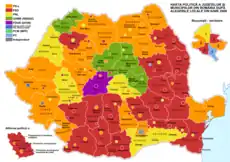

County Councils
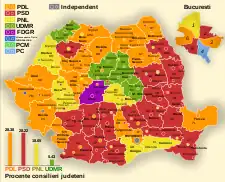
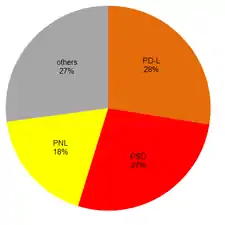

Runoff
The mayoral runoff was held in 1,441 local constituencies. Also, in the communes of Ştefăneşti and Vidra, in Ilfov County the first tour was repeated, due to the cancellation of the election held on 1 June in the two communes. If a runoff is needed for the mayor's election, it will be held on 24 June. A sentence regarding the cancellation of the electoral process in the commune of Iepureşti, Giurgiu is pending from the Central Electoral Bureau.
The independent and former Social Democratic Party member Sorin Oprescu won the election for mayor of Bucharest with 54% against Vasile Blaga from the president's Democratic Liberal Party.[9] Overall, Social Democratic Party won about a third of the mayors, while Democratic Liberal Party won slightly less.[10]
In Voineşti, a tiny town in northeastern Romania, the incumbent Social Democratic Party mayor Neculai Ivaşcu, who died on the election day, was nonetheless elected over his rival, Gheorghe Dobreanu of the National Liberal Party; however, the election commission declared the runner-up elected, but Social Democratic Party said they would appeal that decision.[11][12]
| Party | County Councils Presidents |
Mayors | Local Councils seats (CL) |
County Council seats (CJ) | |||||||||
|---|---|---|---|---|---|---|---|---|---|---|---|---|---|
| Votes | % | Seats | Votes | % | Seats | Votes | % | Seats | Votes | % | Seats | ||
| Democratic Liberal Party (Partidul Democrat Liberal) |
2,243,144 | 28.17 | 14 | 2,964,948 | 33.58 | 908 | 2,356,584 | 27.70 | 11,129 | 2,416,014 | 28.92 | 458 | |
| Social Democratic Party (Partidul Social Democrat) |
2,234,465 | 28.06 | 17 | 2,717,490 | 30.77 | 1,138 | 2,268,271 | 26.67 | 12,137 | 2,337,102 | 27.97 | 452 | |
| National Liberal Party (Partidul Naţional Liberal) |
1,537,840 | 18.08 | 5 | 1,721,834 | 19.50 | 706 | 1,576,214 | 19.80 | 8,529 | 1,521,191 | 18.20 | 297 | |
| Democratic Alliance of Hungarians in Romania (Uniunea Democrată Maghiară din România) |
419,028 | 5.26 | 4 | 378,413 | 4.28 | 184 | 404,657 | 4.75 | 2,195 | 429,329 | 5.13 | 89 | |
| Conservative Party (Partidul Conservator) |
263,200 | 3.30 | – | 224,182 | 2.53 | 47 | 315,825 | 3.71 | 1,398 | 277,492 | 3.32 | 16 | |
| New Generation Party (Partidul Noua Generaţie - Creştin Democrat) |
227,744 | 2.86 | – | 159,739 | 1.80 | 35 | 300,661 | 3.53 | 1,203 | 248,757 | 2.97 | 9 | |
| Greater Romania Party (Partidul România Mare) |
252,956 | 3.17 | – | 124,492 | 1.41 | 19 | 314,731 | 3.70 | 1,090 | 313,666 | 3.75 | 15 | |
| Christian Democratic National Peasants' Party (Partidul Naţional Ţărănesc Creştin Democrat) |
78,752 | 0.98 | – | 53,908 | 0.61 | 11 | 102,137 | 1.20 | 326 | 88,066 | 1.05 | 2 | |
| Other political parties | 703,437 | 10.12 | 1 | 502,202 | 5.52 | 131 | 865,707 | 8.94 | 2,260 | 722,134 | 8,69 | 55 | |
| Total: 18,313,440 expected voters (turnout 49,38%) | 7,960,566 | 100 | 41 | 8,829,208 | 100 | 3,179 | 8,504,787 | 100 | 40,297 | 8,353,751 | 100 | 1,393 | |
| Source: Central Electoral Bureau Archived 2016-03-03 at the Wayback Machine | |||||||||||||
Notable partial election
The legislature of the local authorities is of four years, for all the local authorities. Local elected officials who cannot serve the full term (due to death, incompatibility or resignation) are replaced. The members of the Local Councils and County Councils are replaced by the next person on the list elected. For the Mayors and Presidents of the County Councils, elected on a two-round system, and first past the post respectively, no later than 90 days from the vacancy of the post the Government must announce the day the early election is called. The election is not called if the vacancy occurs in the last six months of the term. The newly elected Mayors and Presidents of the County Councils serve the rest of the term. The ad interim Mayors and Presidents of the County Councils are one of the Deputy-Mayors (elected by the Local Council, if the settlement has more than one Deputy-Mayor), and one of the Vice President of the County Council, elected by the County Council.
Cluj-Napoca
On 22 December 2008 Emil Boc was sworn in as Prime Minister of Romania. He resigned from the office of Mayor of Cluj-Napoca on 4 January 2009. The Government called for partial election in Cluj-Napoca on 15 February 2009. The three main competitors were the ad interim Mayor of Cluj-Napoca, Sorin Apostu (PD-L), former Cluj County Council President and current Senator Marius Nicoară (PNL), and former Cluj-Napoca Police commander, Teodor Pop-Puşcaş (PSD).
References
- the Government's Press Release
- Romania's PSD and PC form alliance (SETimes.com)
- Romanians vote in local elections (SETimes.com)
- Low turnout in Romania's local elections (SETimes.com)
- "Adevarul". Archived from the original on 2008-06-04. Retrieved 2008-06-05.
- Biroul Electoral Central | PRIMA PAGINA |- Alegeri pentru autoritatile administratiei publice locale iunie 2008
- "Adevârul newspaper". Archived from the original on 2008-06-20. Retrieved 2008-06-22.
- Official results
- Exit poll shows leftist candidate to become mayor of Bucharest
- BalkanInsight.com – Independent Mayor for Capital of Romania
- "AFP: Dead Romanian candidate wins mayoral vote". Archived from the original on 2011-05-20. Retrieved 2008-06-16.
- HotNews – Candidate defeated in Voinesti, Romania to become mayor after rival died on local elections day
